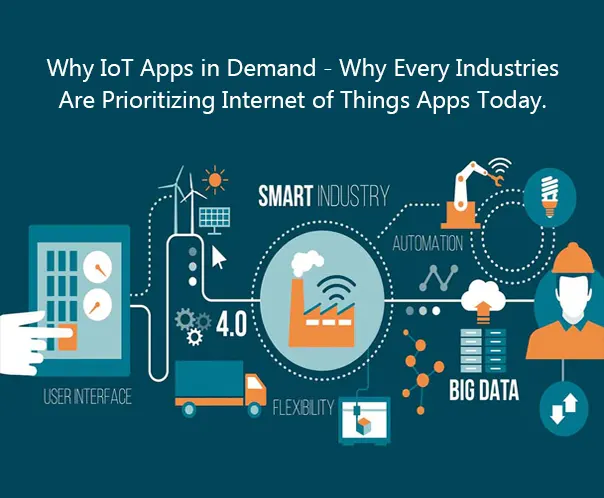Digital automation has become a driving force in various industries, and among the emerging technologies, the Internet of Things (IoT) or IoT Apps stands out as a game-changer. With customized IoT mobile app development solutions, organizations are now streamlining, automating, and monitoring their business processes. These IoT apps not only collect real-time insights from unstructured data but also enhance visibility across different business functions, enabling proactive monitoring and necessary actions.
If you can control and monitor your thermostat from anywhere using your smartphone. Or being able to track your lost pet’s location through IoT-enabled collars or devices.
Prioritizing IoT applications:
As digital automation continues to dominate all aspects of transformative business, IoT stands out as a technology that is driving significant change. With customized IoT mobile app development solutions, organizations can streamline processes, automate functions, and monitor operations in real time.
The ability to gather insights from unstructured data and increase visibility across siloed functions empowers businesses to make informed decisions, optimize workflows, and stay ahead of the competition. As the market for IoT in manufacturing continues to grow, it is undeniable that embracing IoT mobile app solutions is crucial for businesses seeking to thrive in the digital era.
The Power of Real-Time Insights:
IoT mobile app development solutions provide organizations with the ability to gather valuable insights from unstructured data in real-time. By connecting devices, sensors, and machines, businesses can collect and analyze data on a scale that was previously unimaginable. This data-driven approach enables informed decision-making, predictive maintenance, and proactive problem-solving. With IoT apps, organizations can stay ahead of potential issues, optimize processes, and enhance overall operational efficiency.
Increasing Visibility Across Siloed Functions:
Traditionally, many businesses have struggled with disconnected and siloed functions. IoT mobile app development solutions bridge this gap by providing a holistic view of operations. By integrating different systems and devices, IoT apps enable seamless data exchange, fostering collaboration and communication across departments. This increased visibility allows for better monitoring of key functions, identifying bottlenecks, and optimizing workflows.
The Growing Market of IoT in Manufacturing:
The market potential for IoT in manufacturing is evident from its impressive growth projections. In 2021, the global IoT in manufacturing market was valued at $50.0 billion, and it is expected to reach a revenue of around $87.9 billion by 2026, with a CAGR of 11.9%. This exponential growth indicates the increasing adoption of IoT mobile app development solutions in the manufacturing sector, leading to improved operational efficiency, cost reduction, and enhanced productivity.
Globally, approximately 127 new devices are connected to the Internet per second. And that’s just going to grow. By 2020 there will be 50 billion connected devices worldwide—more than twice as many people on Earth!
The Internet of Things (IoT) could have an annual economic impact of $3.9 trillion to $11.1 trillion by 2025 across many different settings including factories and cities.
According to a report, the global IoT market was valued at USD 544.38 bn in 2022 and is expected to grow at a CAGR of 26.1%. It is projected to reach USD 3,352.97 bn. by 2030.
How intriguing is technology, isn’t it?
IoT is revolutionizing our homes, cities, industries, and even our health. The global IoT in manufacturing market size is projected to reach $87.9 billion by the end of 2026, presenting a CAGR of 11.9% from 2021 to 2026. This growth showcases the increasing adoption of IoT in transformative business operations.
Transforming Manufacturing Industry – IoT Apps is a proactive phase to manage:
With IoT-enabled sensors and devices, businesses can gather real-time data on equipment performance, inventory levels, and energy consumption. This data allows for predictive maintenance, reducing downtime, and optimizing productivity. IoT also enables remote monitoring and control, enhancing operational efficiency and reducing costs.
The changing landscape of healthcare and patient care through IoT:
In the healthcare industry, IoT is improving patient care and management. Connected devices, such as wearables and remote monitoring systems, collect patient data in real-time, allowing for proactive interventions and personalized treatments. IoT-powered healthcare solutions enable remote patient monitoring, telemedicine, and preventive care, leading to better patient outcomes and resource optimization.
From Urbanization to Innovation – Role of IoT App for Smart City Transformation!
Smart cities are another area where IoT is making a significant impact. Through IoT sensors and devices, cities can gather data on traffic flow, air quality, waste management, sufficient and steady supply of clean water, monitoring pollution and public health, energy consumption, etc. This data helps in optimizing urban planning, improving sustainability, and enhancing the quality of life for residents.
The potential of IoT is immersive, and organizations across industries are embracing its capabilities. From optimizing supply chains and logistics to enhancing customer experiences and improving operational efficiency, IoT is driving transformative business outcomes.
What is IoT?
The Internet of Things (IoT) is a network of interconnected devices that communicate with each other through the Internet, enabling the transfer and exchange of data. IoT revolutionizes the way we interact with our daily life applications.
IoT services extend beyond the boundaries of our homes.
In smart homes, appliances like air conditioners, thermostats, security alarms, doorbells, smoke detectors, and water heaters can seamlessly share data with users via mobile IoT devices, enhancing convenience and efficiency.
On a larger scale, industries across various sectors are embracing IoT technology to keep in the loop every of their operational efficiency. From manufacturing and healthcare to agriculture and logistics to weather assessment, Alzheimer patients tracker to pet tracker, IoT enables businesses to personal lives by optimizing our daily life operations, enhancing productivity, and delivering innovative solutions.
- IoT Applications for transforming manufacturing processes, enabling real-time monitoring of equipment, predictive maintenance, and efficient supply chain management.
- IoT Applications for healthcare, using IoT devices and wearables, enable remote patient monitoring, personalized treatments, and improved healthcare outcomes.
- Agriculture benefits from IoT by utilizing sensors to monitor soil moisture, temperature, and other environmental factors, allowing for optimized irrigation, improved crop yields, and reduced resource waste.
- Transportation and logistics industries leverage IoT for real-time tracking of assets, fleet management, and route optimization, leading to streamlined operations and cost-effective solutions.
IoT makes the world increasingly interconnected, it expands across industries, enabling us to create smarter ecosystems and a more connected future.
New Market Penetration Opportunities in IoT Mobile App Development:
Increasing demand for IoT mobile app development services as businesses propose to leverage the power of IoT Applications and their associated technology.
INDUSTRIAL DOMAIN
- supply chain network optimization
- quality control and assurance
- inventory management and tracking
- IoT-capable energy management and audit
- IoT Asset Tracking and Management
HEALTHCARE DOMAIN
- Remote patient monitoring
- Smart medical devices and Wearable Trackers
- Medication management
- Patient Tracker
- IoT-Enabled Hospital Equipment Tracking
AGRICULTURE DOMAIN
- Crops monitoring
- livestock updates and monitoring
- Soil conditions
- Weather patterns focusing
- Smart pest infestations
- Smart Irrigations
RETAIL DOMAIN
- Self-checkouts
- inventory tracking AND management
- Loss prevention and security
- Real-time promotion
INDUSTRIAL DOMAIN
- Automated and remote equipment management
- Predictive equipment upkeep
- Smart utility meters
- Smart logistics and tracking
IoT-Based Smart Waste Management
CONSUMABLE IOT DOMAIN
- Smartwatch
- Smart locks
- Home voice assists
- Smart Air Conditioner and Controller
- Smart Smoke alerts
- Pet Tracker
Developing IoT mobile apps for real-time data collection, analysis, and predictive maintenance in industries like manufacturing and agriculture exploring opportunities to integrate IoT mobile apps with wearables and connected devices for personalized experiences.
Designing IoT mobile apps with features like location tracking, asset management, and energy optimization for the transportation and logistics sectors, data security, and privacy, IoT apps can address those concerns and build a trusted ecosystem among industries.
Advantages of IoT Technology for Every Industry!
The Internet of Things (IoT) has become a transformative force across industries, offering numerous benefits and opportunities. This interconnected network of devices and sensors is revolutionizing the way businesses operate and providing a competitive edge in the modern world.
Let’s explore some of the advantages that IoT technology brings to every industry:
- Improved Efficiency: IoT enables real-time monitoring and data collection, allowing for better decision-making and resource management. From optimizing energy consumption in manufacturing to streamlining supply chain operations, IoT technology enhances overall efficiency.
- Enhanced Productivity: By automating processes and enabling seamless connectivity, IoT technology empowers employees to focus on higher-value tasks. With IoT-enabled devices, workers can access real-time information, collaborate remotely, and increase productivity.
- Cost Savings: IoT technology helps businesses reduce operational costs through predictive maintenance, optimized resource allocation, and energy-efficient systems. By monitoring equipment health and predicting failures, IoT reduces downtime and minimizes maintenance costs.
- Data-driven Insights: IoT generates a massive amount of data, which can be analyzed to gain valuable insights. This data-driven approach enables businesses to understand customer behavior, anticipate market trends, and make well-informed decisions for growth and innovation.
- Improved Safety and Security: IoT enhances safety in industries such as manufacturing, healthcare, and transportation by detecting hazards, monitoring employee well-being, and ensuring compliance with safety protocols. Additionally, IoT improves security by enabling remote monitoring, access control, and real-time threat detection.
- Boost Customer Experience: IoT apps allow personalized and large user experiences for all. Through connected devices, businesses can gather data on customer preferences and behaviors, offering tailored recommendations and services.
- Sustainable Practices: IoT technology helps businesses adopt sustainable practices by optimizing energy consumption, reducing waste, and improving environmental monitoring. From smart buildings to smart agriculture, IoT contributes to a greener and more sustainable future.
- Supply Chain Optimization: IoT enables end-to-end visibility and traceability in supply chain management. Businesses can track inventory, monitor conditions during transportation, and ensure timely delivery, reducing bottlenecks and improving customer satisfaction.
- Innovations and New Business Models: IoT technology opens doors to new business models and revenue streams. By offering IoT-enabled products and services, businesses can unlock opportunities for subscription-based models, data monetization, and value-added services.
Conclusion:
Collaborating with IoT app development Agencies, they give solution integrators to offer end-to-end IoT app development solutions through mobile apps.
Catering to the growing market of smart business to smart industry exposer, IoT mobile apps enable seamless connectivity and control of smart devices to improve
efficiency by reducing upfront costs and waste.
The impact of IoT mobile apps is undeniable, transforming industries and driving more significant profits. From manufacturing and healthcare to transportation and smart homes to Healthcare and fitness, IoT solutions have disrupted traditional operations, making them more efficient and productive.
If you’re seeking to explore the true value of IoT for your business, as the Best IoT App Development Agency we are here to help. Whether it’s optimizing processes, enhancing customer experiences, or creating innovative business models, Maven Technology can develop a customized IoT mobile app tailored to your specific needs. Make your future by using IoT-enabled solutions and take your business to new heights with IoT mobile apps. Contact us today to get started.





